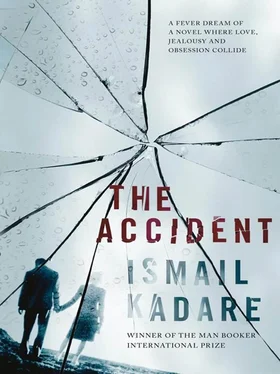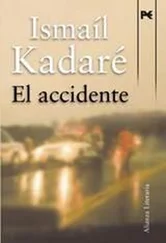As so often, Rovena’s story was left incomplete. While she was in the bathroom, he switched on the television and surfed the channels. Most were in Dutch. On one, he thought he heard Albania mentioned. He found the news in English.
“The queen has died,” he said to Rovena, as she returned to the bedroom.
She lifted her eyebrows in surprise. “But that was months ago, don’t you remember? We were in that motel, in Durrës.”
“Of course I remember. But this is another queen. The king’s wife, not his mother.”
“I see, how extraordinary,” she said.
On the screen, the black motorcade slowly approached the cathedral in Tirana.
Covering her bare shoulders, Besfort also expressed surprise. “How very… For a small country, once Stalinist, to have two queens die… In such a short time.”
Trembling, she held him tightly.
Chapter Thirteen
The last seven days.
It was hard to tell if either of them felt any foreboding one week before the accident.
Rovena, taking shelter from the torrential rain in a café, thought about her lover’s arrival. At precisely that moment, one thousand kilometres away, Besfort’s thoughts, as he watched the television news, wandered to Rovena’s white belly and the possibility that she might be pregnant. On the screen, Pope John Paul II looked feebler than ever, but nobody could hope for any concession from him on sexual relations between men and women. Everything would have to be the same as a thousand, four thousand, forty thousand years ago. Besfort counted the remaining days until he would see Rovena, and they seemed to him too many. In the café, Rovena dialled the code for Switzerland, but suddenly recalled that phone calls cost more at peak hours, and decided to talk to her friend later.
The rain grew heavier. Passers-by caught in the downpour ran terrified for shelter. One of them seemed continually to be changing shape as his cape was blown by the wind. After the pope, Arab terrorists appeared on the screen, threatening a kneeling European hostage. Besfort closed his eyes so as not to see the blow. Rovena unthinkingly dialled Switzerland again, but remembered the peak rate. The pedestrian with the billowing cape passed by menacingly, almost clinging to the café window. He appeared spreadeagled against it, until he detached himself and flew away as if whirled by some black tornado. Perhaps that is what Plato’s androgynes would look like, she thought. Besfort had mentioned them in their last phone call. She had been amused at first.
“Awesome,” she said laughing, “a man and a woman in one body. No more she-loves-me, she-loves-me-not.”
“And that was why the gods envied them,” Besfort said, “and out of jealousy divided them. And since that time, says Plato, the two halves have been searching for each other.”
“How sad,” she said. The song about the two lives with the same love flashed into her mind in a garbled form, just as she had once heard it sung by a drunk in the doorway of a bar in Tirana:
If I could live my life anew
I’d never give myself to you.
Rovena nervously dialled the code for Switzerland a third time. A thousand kilometres away, Besfort turned off the television in disgust. The news was all so crazy.
The storm eased slightly, only to grow wilder again, although now there were only dry gusts without rain. Rovena barely managed to reach the entrance to her block. She climbed the stairs to her apartment, closed the window and stood stock still behind the double glazing. The wind howled threateningly and then whined in lamentation, as if begging for mercy. A part of the view lay in darkness, and the rest was bathed in a sickly light in which sheets of cardboard, tar paper and garbage of all kinds were blown in every direction. You could find anything out there, she thought. Empty forms, whose essences had evaporated long ago, spun round in eddies. And she thought of her tattoos, now faded, and perhaps their two halves, his half and hers, so pitilessly divided, looking for each other.
In the evening, on the television news, among the scenes of storm devastation, there was a report on an old provincial theatre whose props had been carried away by the gales. Two particularly valuable capes for Hamlet , one from a production of 1759 and the other from a century later, had been lost, and the theatre promised a reward for their recovery. What a ridiculous news item, thought Besfort as he switched off the television again.
He went to bed just after midnight as usual. Towards morning, he was woken by a dream.
A kind of languid desire he had never experienced before totally sapped his strength. It included grief mixed with despair to such an impossible degree as to create a limitless, immeasurable sweetness.
It was the kind of dream that lingers in the mind. There was a plateau bathed in pale light from an unknown source. In the middle was a structure of plaster and marble, a kind of mausoleum that was also a motel, towards which he was calmly walking.
He was seeing it for the first time, although the structure was not unfamiliar to him. He stood in front of what were not so much its door and windows as the places where they had once been, now covered with oily paint resembling plaster, and barely visible.
He felt that he knew why he was there. He even knew what was locked inside, because he called a name out loud. It was a woman’s name, which, although he uttered it himself, he could not hear or even identify. It emerged falteringly, despairingly from his throat. He was aware merely that the name had three or four syllables. Something like Ix-et-in-a…
He remembered the strange continuation of the dream, and his weakness and longing became unendurable.
He turned on the bedside lamp and looked at his watch. It was half past four. It occurred to him that even dreams that seem unforgettable can later fade away.
First thing in the morning he would phone Rovena and tell her about this. He must.
This thought reassured him, and he fell asleep at once.
With these two storm-battered capes, the life stories of Besfort Y. and Rovena St. were strangely cut short a week before they actually ended. In an explanatory note, the researcher had repeated his position that, being unable to reproduce the couple’s story in full on the basis of the results of the inquiry, he had concentrated on the last forty weeks of their lives. The ending of the story with the two Hamlet costumes carried away by the gale was accidental, and therefore probably could not be taken as a symbolic closure. Still less could Besfort Y.’s pre-dawn dream, which he related to Rovena on the phone a few hours later, be considered in the same light. But there may have been another reason why, in spite of all promises, the final week – usually the most keenly anticipated in a story of this kind – was omitted.
The more closely the researcher examined this last week, which was at first sight so straightforward, the more significant it became. But he was always thrown back on the problem of its incompleteness. The three last days had detached themselves entirely from the chain of events which death had brought to an end. These were the three days for which Besfort Y. had requested leave from his office at the Council of Europe. Apart from his application for leave, made orally in his final telephone call, there was no tangible evidence of these last three days anywhere. The testimony of the bartenders and receptionists was vaguer than ever. There was no record of any phone calls from their hotel room and both their mobiles were switched off. It was as if these three days were not their own, but were unclaimed stretches of time of the kind that may wander around the universe unattached to any human life, trying to find some temporary lodging. So they floated adrift, bound to nobody, and not understood by anyone, least of all by those in whose lives they took refuge.
Читать дальше












